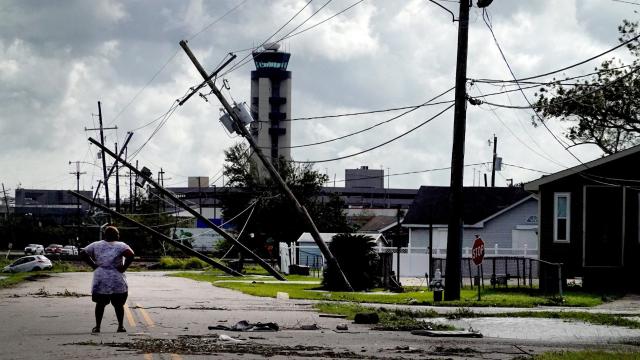In recent years, a growing chorus of voices has been calling to hold oil and gas companies like Exxon accountable for lying about climate change while keeping the world hooked on fossil fuels. But utilities are also in need of some scrutiny. And Entergy, the utility that has left New Orleans and surrounding communities in the dark following Hurricane Ida, is one of those most deserving.
On Sunday, the entirety of New Orleans lost power after Entergy suffered what it called “catastrophic transmission damage” after a major transmission line crumpled into the Mississippi River and numerous lines fell throughout the region. Now, the utility is scrambling to fix the mess, though it currently has no idea when electricity access will be restored and said it could take weeks. That means the more than 793,000 Entergy customers without power will be forced to deal with blistering heat without air conditioning and nowhere to store fresh food, all while trying to put the pieces of their lives back together.
Scientists haven’t yet analysed exactly how climate change influenced Ida. But an abnormally hot ocean fuelled the storm, and its heavy rains, roaring storm surge boosted by rising seas, and slower movement are all hallmarks of the climate crisis. Entergy has been integral in contributing to that crisis and has failed to prepare its own rickety grid for disaster.
“Entergy has known for decades — including longer than almost any of the general public who are suffering through Ida and its aftermath — that burning fossil fuels causes climate change, that climate change causes more extreme weather, and that these effects would create vulnerabilities for the electric grid,” David Pomerantz, the executive director of the Energy and Policy Institute, said in an email. “Despite that knowledge, Entergy has used deception, bullying and political power only available to monopolies to continue burning fossil fuels and to delay or kill efforts that might have made its customers become more resilient to climate change.”
Entergy has only had its current name since 1989, but it’s been around for 100 years. In 1933, it became a founding member of the Edison Electric Institute (EEI), and it is also a longtime member of the Electric Power Research Institute (EPRI). A report by the Energy and Policy Institute shows these groups have known about climate change since at least 1968, when Donald Hornig, a science advisor to then-President Lyndon Johnson, addressed EEI’s annual convention and warned of the “catastrophic effects” (sound familiar?) rising carbon dioxide levels could have.
The utility has also had ample warnings of those impacts on the grid. In 1988, a paper published by EPRI — again, of which Entergy was a member — explicitly said that “system reliability could be affected if climatic changes result in more-frequent and more-severe [sic] storms.” In 2005, Entergy saw a clear illustration of that fact when Hurricane Katrina knocked its energy infrastructure offline and left more than 2 million people without power — and now it’s once again dealing with a similar problem post-Ida.
Yet in the intervening years, Entergy has consistently opposed efforts to get off oil and gas and efforts to make the grid more resilient. Last year, it announced a plan to reach net zero by 2050… by expanding the use of carbon-polluting natural gas. The previous year, the firm pushed to gut a plan to pay customers for excess solar energy that they sell back to the grid, and according to emails obtained by Energy and Policy Institute, Entergy’s president of utility operations Rod West baselessly accused the “solar lobby” of stoking a “class war.”
The company loves gas so much, an independent investigation found that it even hired actors to show up at a 2018 city council vote in a show of astroturfed support of a new gas plant in New Orleans despite widespread local opposition. (The plant was approved over those local objections, though Entergy coughed up a $US5 ($7) million fine.)
The utility has fought tooth and nail against federal climate regulations, too, including a 2007 bill to increase renewable power, a landmark 2009 cap and trade bill, and the Environmental Protection Agency’s 2015 Clean Power Plan.
At the same time, it’s fought against policies to make the grid ready to handle to extreme weather. In December 2019, it threatened to sue New Orleans for passing a “resilient renewable portfolio standard” requiring city electricity to reach net-zero carbon by 2050 and strengthen its climate resilience. All these efforts have both worsened the climate crisis and made catastrophic damage to the grid all but inevitable.
“Throughout all this, the company’s executives and shareholders have profited handsomely,” said Pomerantz. “Whether via policy or litigation, Entergy’s shareholders should be forced to pay to help its customers recover from the tragedy that they helped to exacerbate with their actions and inactions.”
